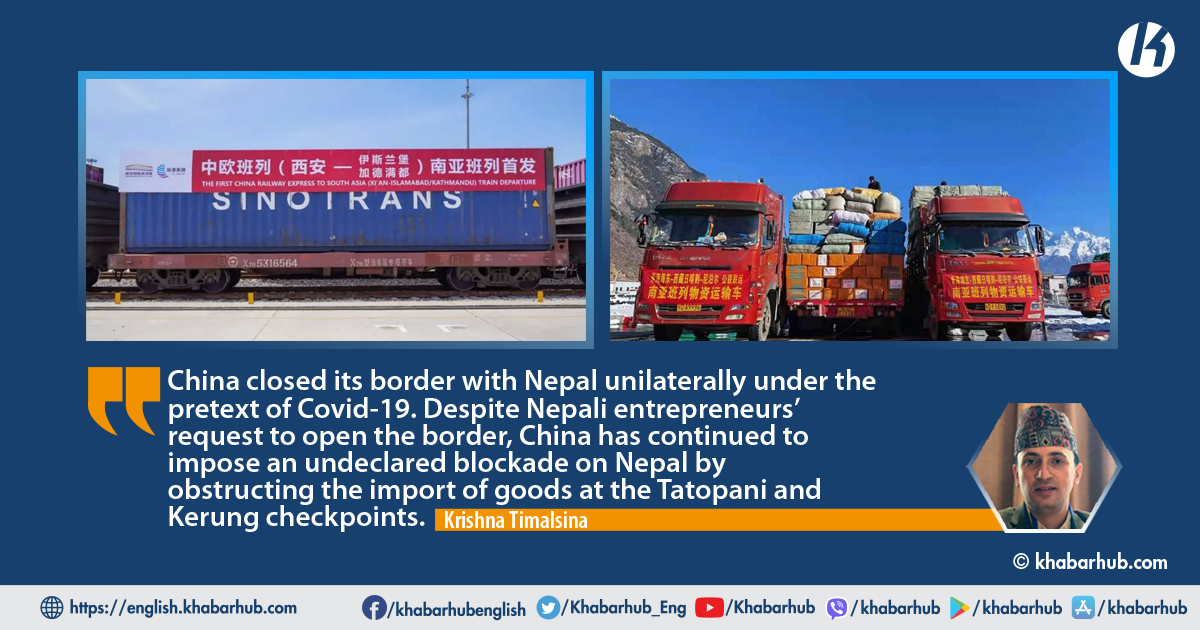KATHMANDU: The continuous obstruction of the Chinese government, which had announced Nepal as a “land-linked” country, has adversely affected Nepal’s economy.
Entrepreneurs involved in Nepal-China trade say the undeclared blockade on Nepal has adversely affected their trade incurring a loss of millions.
According to them, China has still yet to allow Nepali trucks like before from the Tatopani and Kerung checkpoints by making various excuses.
According to Ashok Kumar Shrestha, president of the Nepal Himalayan Cross-Border Chamber of Commerce, the season for uninterrupted import of goods from both Tatopani and Kerung borders is over because, during monsoon, the border points are often obstructed due to floods and landslides.
Currently, Chinese officials are obstructing the shipment of loaded garments and other items to Nepal.
Due to the Covid-19 seen in Wuhan in late 2019, trade with Nepal has been affected by various restrictions.
The then Minister of Industry, Commerce and Supplies Matrika Prasad Yadav and Chinese Ambassador to Nepal Hou Yanchi had inaugurated the checkpoint in 2076 BS.
Since then, the entire world has recovered from the Coronavirus pandemic and almost all international borders are open.
However, the restrictions and surveillance imposed by China on the Nepal-China borders have remained unchanged.
China, which closed its borders completely for two years in the name of controlling the Covid, had earlier closed the Tatopani border after the 2015 devastating earthquake.
However, neither the Kerung border nor the Tatopani border has witnessed a smooth movement of late.
As a result, quite a lot number of containers carrying goods procured by Nepali traders after opening tens of millions of LCs have been stopped for months in different cities of China.
The air service, which was suspended, has resumed gradually in China. In this changed context, Ashok Kumar Shrestha, president of the Himalayan Cross-Border Chamber of Commerce, expects trade to be smooth now.
Students who have been stranded in Nepal for nearly two and a half years have started returning.
However, Shrestha says that both the customs checkpoints on the Chinese side have become unfavorable due to bad weather.
Silk Transport, which has been importing goods at Tatopani alone since 2072 BS, and has been entrusted with the task of bringing chemical fertilizer to the Nepali market, has not been able to bring fertilizer as per the agreement because of China’s obstruction.
“Chinese officials have been reluctant to talk to our government, and the initiative taken by the Ministry of Foreign Affairs has not been effective,” Shrestha said.
According to him, there is a problem with the intention of the Chinese side.
According to traders, the Tatopani customs checkpoint, which was repaired and brought into operation by the Chinese side after the devastating earthquake of 2015, is still not operating smoothly.
The then Minister of Industry, Commerce and Supplies Matrika Prasad Yadav and Chinese Ambassador to Nepal Hou Yanchi had inaugurated the checkpoint in 2076 BS.
However, hundreds of containers are stranded and are parked on the left and right sides of the highway.
According to Bedh Bahadur Shrestha, former president of the Sindhupalchok Chamber of Commerce and Industry, the dry port of Larcha, built by the Chinese government at a cost of tens of millions, has become unusable due to the non-regularity of the Tatopani checkpoint.
The condition of the Tatopani checkpoint is no different, and it takes months for containers to reach Kerung now, said Shrestha.
According to traders, some oil tankers entered Nepal from the Kerung border point during the earthquake.
Even after the blockade imposed by India in 2015, the Chinese authorities, who had given a symbolic message that all goods would enter from China, have always been narrow-minded when it comes to bilateral trade.
Nepali Congress (NC) leader Mohan Bahadur Basnet, meanwhile, said that he met the Prime Minister and the Home Minister several times urging them to hold talks with the Chinese side to ease the border issue.
At present, the dollar reserves in the country have declined. Nepali businessmen have opened LCs worth millions of dollars and ordered goods.
But, it takes months for the goods to arrive. This is having a negative effect on the country’s economy.
Basnet said that even the chemical fertilizers have been stopped in the Tatopani customs point, adding that farmers in Nepal are suffering due to a lack of fertilizers.
UML leader Sher Bahadur Tamang, an MP from Sindhupalchok Constituency No. 2, said that the initiative was taken by the then KP Oli-led government to make the Tatopani checkpoint smooth and solve the problem in the border area but the problem is still unresolved.
During the inauguration of the Tatopani checkpoint, Chinese Deputy Minister of Commerce Zhang Xiangchen assured smooth Nepal-China trade and commerce.
The issue was even raised when Foreign Minister Wang Yi visited Nepal to resolve the issue.
According to businessmen, there is a similar problem at Kerung in Rasuwa as well.
Earlier, as many as 17 containers were used to enter each day from there. However, hardly seven containers enter Nepal now.
During the review period of the current Fiscal Year, Tatopani Customs Office has collected revenue of Rs. 2.83 billion.
Likewise, goods loaded by Nepali businessmen after opening the LC months ago are still stranded in Guangzhou because of the quota system.
And Chinese government officials, who are creating an undeclared blockade at the border with Nepal, have been amplifying the BRI project for common prosperity.
Danarbu Sherpa, the operator of Namaste Transport, says that he is incurring a loss of around Rs. 40,000 each day for not being able to bring goods from China.
Silk Transport, which has been importing goods at Tatopani alone since 2072 BS, and has been entrusted with the task of bringing chemical fertilizer to the Nepali market, has not been able to bring fertilizer as per the agreement because of China’s obstruction.
At present, around 10 containers are entering Nepal through the Tatopani checkpoint where hundreds of containers used to enter in the past.
Northern border losing faith
According to the Nepal Himalayan Cross-Border Chamber of Commerce, quite a significant number of traders have started doing business through the Indian port of Calcutta after Chinese authorities started surveillance at the border with Nepal.
Sindhupalchowk’s Tatopani and Rasuwagadhi checkpoints are both problematic.
If the government does not take decisive action against China, the Tatopani and Rasuwagadhi checkpoints would be closed.
The closed dry port at Larcha will also be closed, said Yadav Dahal, the outgoing general secretary of the Sindhupalchok Chamber of Commerce and Industry.
Nepali businessmen are importing goods through India by paying high fares as both the checkpoints on the Chinese side are not operational.
During the review period of the current fiscal year, goods worth more than Rs 2.26 trillion have been imported from China.
If all this had come through Tatopani and Kerung border points, the revenue collection would have increased.
Hardly 20 percent of the goods have come from the land route. Goods imported from various other Chinese cities have reached India by sea and entered Nepal.
Paper Tiger: BRI
Nepali businessmen have been demanding to make transactions through Nepal-China customs checkpoints easier.
However, Chinese officials have not been positive. As a result, it is having a negative impact on Nepal’s economy, which is becoming extremely sluggish.
It takes about 3 thousand dollars more to bring a container of goods to Nepal through Calcutta port and that, too, in 3 months.
In the last four months of this year, despite the complex international situation and the Covid pandemic, the total imports and export between China and the countries around Belt and Road amounted to 3.9 trillion and 70 billion yuan.
And Chinese government officials, who are creating an undeclared blockade at the border with Nepal, have been amplifying the BRI project for common prosperity.
On June 10, China Radio International, a state-owned radio station in China, posted a photo on its Facebook page: Building a fast track to shared prosperity from “BRI” by connecting from infrastructure to mind.
A few days ago, the first South Asian international train full of daily necessities and electronic goods departed from the Chinese Sichuan Provincial Chengdu International Railway Port towards Kathmandu.
After the train reaches the port of Chilong in Tibet, the cargo will be transported to the destination by container transport from the highway.
This mode of rail-highway combined transport will save about 20 days compared to the earlier conventional mode of transport and sea transport. It is still an effective and fast transport channel.
This is not the first time that the Chinese state media has reported on the operation of the South Asian International Railway.
Earlier, similar pictures and news came during the blockade imposed by India on Nepal.
Also on May 22, 2020, the Chinese spread confusion by saying that the first South Asian freight train was operating from Xi’an city in Palo Shanxi province to Kathmandu.
Claiming to provide opportunities for common prosperity to various countries, China continues to embarrass small economies like Nepal.
In the last four months of this year, despite the complex international situation and the Covid pandemic, the total imports and export between China and the countries around Belt and Road amounted to 3.9 trillion and 70 billion yuan.
Compared to the previous year, China has been increasing its economic turnover by 15.4 percent and has been weakening Nepal’s economy by showing only confusion on the border with Nepal.
Looking at the picture of the border with Nepal, China is promising to connect Nepal with the outside world through infrastructure and is constantly breaking the hearts of Nepali businessmen and its people.









Comment